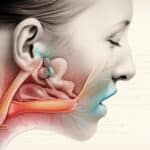Tinnitus and Hearing Loss: The Unspoken Link and How to Find Relief
- Get link
- X
- Other Apps
Introduction
Tinnitus and hearing loss, two terms that can strike fear into the hearts of any music lover or concert-goer, are often discussed in the same breath. These two conditions frequently overlap, causing distress and discomfort to those affected. But what exactly is the connection between the mysterious ringing in your ears known as tinnitus and the gradual loss of auditory ability? Let’s delve into these baffling auditory conditions and discover how they are related.
What is Tinnitus?
Imagine hearing a constant ring, hum, or buzz in your ears even in complete silence— this is the reality for those living with Tinnitus. It’s not an external sound; instead, it’s often a sign that something is off in the auditory system, which includes the ear, the auditory nerve linking the inner ear to the brain, and the brain’s auditory processing areas. Tinnitus can present itself in various forms, taking on the guise of ringing, hissing, and buzzing, to roaring and clicking. There is a wide array of kinds of tinnitus, each with unique characteristics and causes.
Causes of Tinnitus
Tinnitus, while perplexing, usually isn’t an isolated problem. It’s essentially a symptom of underlying health conditions, particularly in the auditory system. Let’s explore a few potential causes. A widespread reason is ear infections, disrupting the flow of soundwaves resulting in the characteristic ringing— read more about how an ear infection could cause tinnitus here.
A more common culprit is exposure to loud noises. Yes, that rock concert or industrial machinery can lead to unnerving noises in your ear. Dive deeper into how this happens in our post about tinnitus from ear wax. Lastly, certain medications, believe it or not, can have tinnitus as a side effect, especially when consumed in high doses.
Understanding Hearing Loss
Now, let’s discuss hearing loss. This term refers to a decrease in the ability to perceive sounds and can happen to anyone, regardless of age. Contrary to popular belief, it’s not just the elderly who are at risk of experiencing hearing loss; exposure to loud noises, certain illnesses, and even genetics play a significant role. Hearing loss takes multiple forms, from not being able to hear certain frequencies or sounds like speech, music, and environmental sounds, to severe cases where all forms of sound are dulled or lost.
The Connection Between Tinnitus and Hearing Loss
The correlation between tinnitus and hearing loss is more significant than one might assume. Although it is possible to have tinnitus without hearing loss, in many instances, individuals with tinnitus also have some form of hearing loss. How so? Well, damage to the tiny hair cells within the cochlea (an inner part of our ear) can lead to both tinnitus and hearing loss. You see, these cells vibrate in response to sound waves. This vibration is then converted into signals that our brain interprets as sound. But, when these hair cells are damaged, they can send random electrical impulses to our brain, causing tinnitus. You can explore more about this complex condition over at our comprehensive guide on tinnitus hearing loss. Moreover, ‘The Mayo Clinic’ has done some extensive clinical studies showing this interconnected relationship, which you can refer to for high-end medical explanations.
Symptoms to look for: Tinnitus and Hearing Loss
So, how can you tell if you’re grappling with tinnitus or hearing loss? Apart from the obvious signature ‘ringing’ sound of tinnitus, there might be other sounds like buzzing, humming, or whistling that you can’t seem to locate the source. In some cases, these phantasmal noises might intensify during quiet periods like when you’re trying to sleep. On the other hand, the symptoms of hearing loss can be subtle and manifest slowly. You might find yourself asking people to repeat themselves more frequently, have trouble following conversations in noisy settings, or start relying more on lip-reading. You might also find television or radio volumes unsatisfactorily low, even when others find it adequate. Check out our comprehensive list of symptoms for tinnitus to get a better understanding.
Treatment and Management of Tinnitus and Hearing Loss
While tinnitus or hearing loss might seem daunting, it’s not all doom and gloom. Today, various treatment methods and therapies are made possible by advancements in medical science. While there’s no ‘one-size-fits-all’ cure for tinnitus, several treatments can help manage the condition. These include cognitive-behavioral therapy, sound masking devices, and certain medications. Meanwhile, hearing loss management might involve using amplifying devices like hearing aids or cochlear implants depending on the degree and type of your hearing loss. Lack of public awareness around these conditions necessitates the crucial role of audiologists in the detection, management, and control of tinnitus and hearing loss. Discover what an audiologist can do for tinnitus and how they might help you manage your condition.
Challenges with hearing might seem like a daunting hurdle, but with the right professional help, support from loved ones, and some determined resilience, it’s one that you’re more than capable of overcoming. Remember, you’re not alone in your journey.
Precautions and lifestyle changes to prevent Tinnitus and Hearing Loss
In the light of these detailed discussions around tinnitus and hearing loss, proactive measures to maintain good ear health seems like a logical stride. So, what steps can you take to prevent or slow the progression of these conditions? Regular hearing checks are a good place to start. Believe it or not, even simple measures like keeping your ears clean can go a long way. Sound surprising? Just ask all the people who have successfully managed their conditions after implementing some seemingly minuscule lifestyle changes. Ensure you take breaks in between prolonged exposure to loud noises and use earplugs if you can’t avoid the noise. Here’s an eye-opening list of daily habits that might help in reducing tinnitus symptoms and revealing the question does tinnitus go away.
Conclusion
Learning to navigate life with tinnitus and hearing loss can be a journey steeped in frustration and discomfort, but it doesn’t have to be a lonesome one. Recognizing the symptoms early on, understanding the link between tinnitus and hearing loss, and taking steps to address it can go a long way toward improving your quality of life. Seeking professional help like audiologists and physicians can aid you in best managing and possibly mitigating these conditions. Remember, your well-being is paramount and despite daunting diagnoses, strong support networks, professional advice, and a positive attitude can help you sail through the challenging tide and dawn upon better days while taking care of your hearing health.
Tinnitus Hearing Loss - Frequently Asked Questions (FAQ)
Tinnitus itself does not cause hearing loss. However, it’s often a symptom of an underlying condition that might cause both tinnitus and hearing loss, such as damage to the inner ear hair cells.
There isn’t a one-size-fits-all cure for tinnitus, but several treatments can help manage the condition, such as cognitive-behavioral therapy, sound masking devices. For hearing loss, treatment might involve using amplifying devices like hearing aids or cochlear implants depending on the degree and type of your hearing loss. Audiologists play a crucial role in detection, management, and control of tinnitus and hearing loss. Take a look at our post ‘[Audiologist Tinnitus](https://ift.tt/GKLyWpm) to understand better what an audiologist can do for tinnitus and hearing loss.
Yes, noise-induced hearing loss can cause tinnitus. Exposure to excessively loud noise can damage the tiny hair cells in the ear, resulting in both hearing loss and tinnitus.
Not always. It is possible to experience tinnitus without any noticeable hearing loss. But, many individuals with tinnitus also have some form of hearing loss. Recognizing these symptoms early on is critical in preventing further complications and seeking appropriate treatment.
The post Tinnitus and Hearing Loss: The Unspoken Link and How to Find Relief appeared first on Pulsatile Tinnitus Treatments News - Tinnitus Relief.
Related posts:
https://ift.tt/vP8YFuo
#tinnitus #pusatiletinnitus #earringing #whatistinnitus #howtostoptinnitus
- Get link
- X
- Other Apps



Comments
Post a Comment